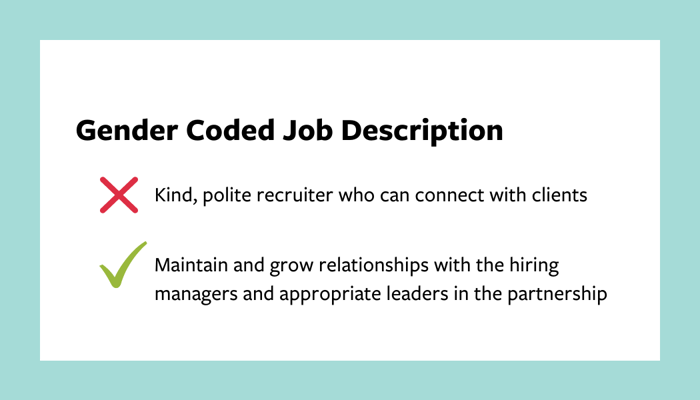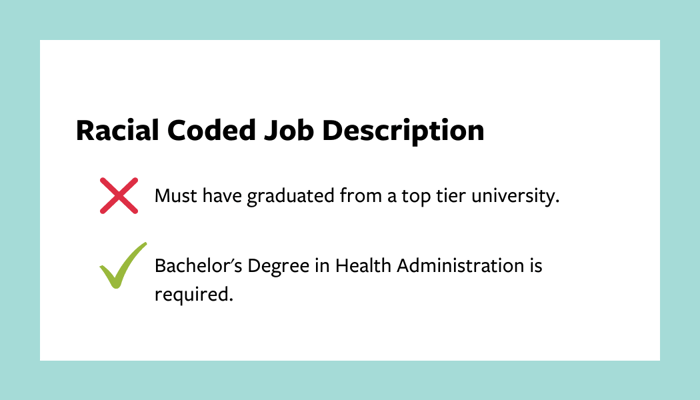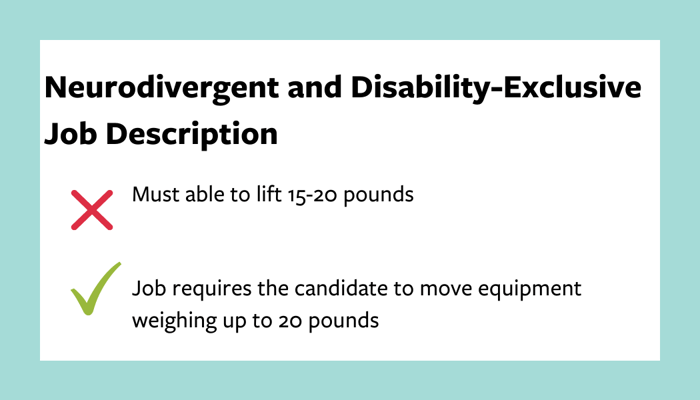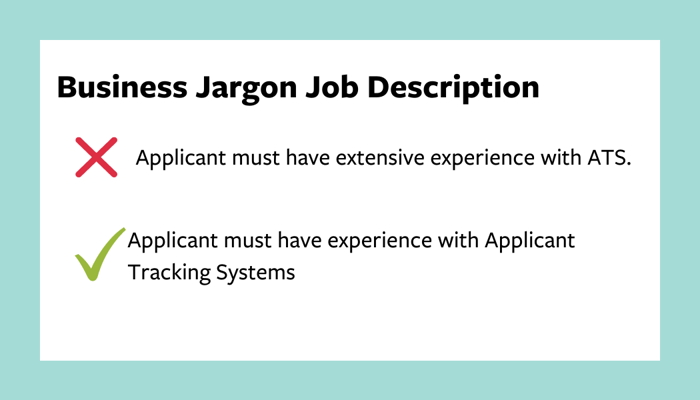How to Create a Job Description That's Inclusive
Use Gender-Neutral Language
Job descriptions can often unintentionally lean towards a particular gender, but becoming aware of what gender-coded words you are using makes a huge difference. If a job description uses words such as "kind," "caring," and "polite," these words come across as more "feminine" and have the potential to keep masculine candidates from applying. In contrast, words like "active," "confident," and "dominant" are more "masculine" terms and potentially keep more feminine candidates from applying.
By avoiding this language, you ensure that your job descriptions appeal to all qualified individuals, regardless of gender identity.

To see if your job description is gender-coded, you can utilize Danielle Gaucher, Justin Friesen, and Aaron C. Kay's Gender Decoder tool.
Consider Cultural and Racial Bias
When writing a job description, you might not realize the words you are using are implicitly biased against a particular race or ethnicity. For instance, avoid mentioning race or national origin in job descriptions altogether. Also, avoid using phrases like "must have strong English skills," "must have attended an Ivy League university," or "must present cleanly shaven/neat hairstyles."
Using this language could deter those candidates for whom English is not their first language, who could not afford to attend a top-tier school, or discriminate against hair or hairstyles typically associated with particular cultures and races. By using this language, your job description creates bias against numerous groups of individuals. Alternatively, asking for educated and professional applicants is fine.

Be Inclusive of People With Disabilities and Neurodivergence
The Americans with Disabilities Act prohibits "discrimination based on disability in employment, state and local government, public accommodations, commercial facilities, transportation, and telecommunications." Yet, many companies have continued to exclude disabled workers by complicating simple tasks in job descriptions.
Be mindful of phrasing that may exclude or discourage individuals with disabilities. For example, avoid using terms like “must be able to walk” or “fast-paced environment” unless they are truly essential for the job. Instead, focus on the outcomes of the role, such as "the ability to complete tasks on time" or "ability to effectively manage workload."
It’s also important to avoid using language that may deter neurodivergent applicants. The Employer Assistance and Resource Network in Disability Inclusion (EARN) says, “If something is not an essential function to accomplish the job, employers should make this clear or not include it.” Instead, focus on core competencies to open the role to a broader range of working styles.
When outlining physical or cognitive requirements, be clear about what is necessary versus what can be adapted. If a job can accommodate sitting or standing, say so. For example, instead of stating, “must be able to stand for long periods,” try “this role can be performed sitting or standing, depending on preference or need.”
Being aware of just how impactful language is to neurodivergent and disabled individuals can help make significant changes to how you write job descriptions.

Avoid Using Business Jargon
Business jargon can be intimidating, even to the most seasoned of job applicants. According to LinkedIn, studies show that jargon and corporate language in job postings deter young applicants from applying (even to entry-level positions).
While you and your team might understand what specific internal speak or acronyms mean, odds are not all individuals will. Replace any complicated jargon with clear and simple language that anyone can understand,, especially if it is particular to your company or a location or region.
By removing particular jargon, acronyms, or technical/regional language, your job description will attract more applicants.

Avoid Limiting Age or Experience
Certain language in job descriptions can dissuade younger or older candidates from applying. Focus on skills and competencies rather than age or arbitrary experience thresholds. Instead of saying, "Must have 10 years of experience," consider "Looking for deep experience in..." to broaden your pool of candidates.
Here are some examples of phrasing to avoid:
- Must be familiar with the latest trends
- Seeking recent graduates
- Energetic and enthusiastic candidates preferred
- Must have a proven track record
Discuss Your Mission and Benefits
Candidates are increasingly looking for workplaces that value diversity, equity, and inclusion (DEI). Make your commitment clear by including a short section in the job description outlining your company’s values around DEI. Mention specific initiatives or programs that demonstrate how your organization supports a diverse workforce.
Mention flexible working arrangements, parental leave policies, and health benefits, as these are appealing across diverse demographics. Avoid listing benefits that cater only to a specific group (e.g., “beer on tap” or “foosball tables”) as they can seem exclusionary.
The Importance of Inclusive Job Descriptions
Inclusive job descriptions provide various advantages, including:
Cultural insight: An inclusive job description can provide insight into your company's work culture, allowing a candidate to determine whether it will be a suitable workplace.
DEI commitment: A job description that promotes inclusivity signals to potential employees that your organization values diversity and is committed to creating an inclusive work environment.
Broader Talent Pools: An inclusive job description ensures that your openings are appealing to a wider range of candidates,, allowing you to find those who better fit the job.
Reduce Unconscious Bias: Creating inclusive job descriptions help mitigate unconscious bias that can creep into the hiring process. By focusing on essential qualifications, you can avoid disqualifying candidates who may be equally or more qualified.
We Can Help You Develop Inclusive Job Descriptions
As recruitment experts, we know how important a well-written and inclusive job description is to finding the best talent. You never know what the best candidate will look like, so you want to be sure that anyone who is qualified feels they can and should apply.
By paying attention to gender-coded, racial-coded, and disability-exclusive language, as well as business jargon, you are ensuring that your company and hiring managers have access to a more diverse slate of qualified candidates.
Want to learn how to write a superior job description to attract top talent? Check out our blog.

.jpeg)


